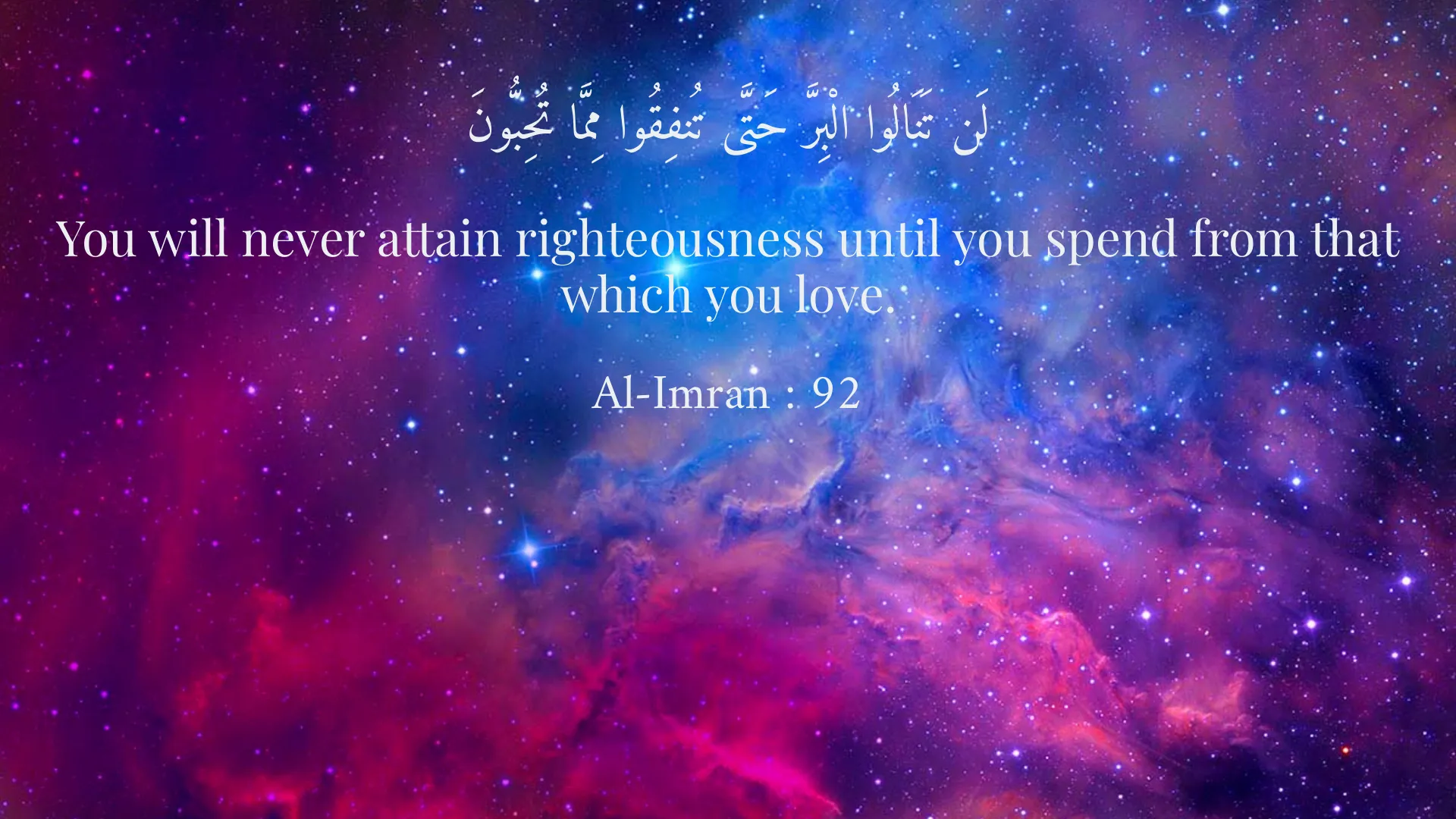Quranic Answer

Generosity in the Holy Quran is a profound concept that encompasses various dimensions of human behavior in relation to faith in God and the well-being of others. It is portrayed not merely as a social or ethical obligation but as a deep-rooted characteristic that stems from a strong belief in God and an earnest commitment to living a life aligned with divine principles. Throughout the Quran, numerous verses illustrate the significance of generosity, portraying it as a reflection of one's faith and as a gateway to spiritual elevation. This paper seeks to explore the concept of generosity as depicted in the Quran, its implications for personal development, community building, and the overarching message of selflessness in Islam. One of the noteworthy verses in the Quran regarding generosity is found in Surah Al-Imran, verse 92, where Allah states: 'You will never attain righteousness until you spend from that which you love.' This particular verse underscores the notion that true righteousness, a state of moral and spiritual excellence, cannot be achieved without a willingness to sacrifice from one’s own beloved possessions or resources. The emphasis on spending 'from that which you love' highlights that generosity is not simply about giving what one does not need but entails an element of sacrifice, indicating a deeper commitment to the welfare of others. This approach to generosity instills in believers a sense of empathy and compassion, ultimately guiding them towards a path of self-purification and growth. Furthermore, Surah Al-Baqarah, verse 261 provides a powerful metaphorical illustration of the rewards awaiting those who generously spend their wealth in the way of Allah. The verse states: 'The example of those who spend their wealth in the way of Allah is like a seed that sprouts seven ears.' This vivid imagery encapsulates the concept of exponential rewards in the afterlife for those who engage in acts of charity. Just as a single seed can yield multiple ears of grain, so too can a small act of generosity multiply in its rewards and impact. The verse serves to motivate believers to contribute to society, instilling hope that their acts of kindness will yield not only material blessings but spiritual enhancements as well. In this regard, generosity in the Quran transcends the mere act of giving. It is a holistic approach toward life that encourages believers to actively partake in the betterment of their communities and to contribute to the alleviation of suffering in the world. Surah Al-Anfal, verse 60 states: 'And prepare against them whatever you are able of power.' Here, the emphasis is on the use of one's capacities and resources for the greater good, implying that generosity is not limited to wealth alone but also includes knowledge, time, and effort. This comprehensive view underscores the collective responsibility of individuals to not only support one another but to harness their abilities to promote justice and equity in society. Moreover, the relationship between generosity and faith in God is fundamentally reciprocal. The Quran posits that those who genuinely nurture their relationship with God through acts of generosity are also more likely to be recipients of divine blessings. As believers engage in giving, they embody the teachings of compassion and mercy, which are central traits attributed to God Himself. This divine connection reinforces the understanding that generosity is an essential element of faith; it nourishes one’s soul, augments their sense of purpose, and fortifies their purpose in life. The Quran also encourages a sense of community, portraying generosity as a means to foster unity among believers. Acts of giving create bonds of love and camaraderie amongst individuals, thereby strengthening the social fabric of the Muslim community. Generosity not only demonstrates one’s love for their fellow human beings but also invites a spirit of togetherness, encouraging individuals to care for one another in times of need, thereby nurturing a harmonious environment. This community-centered approach not only enhances interpersonal relationships but fosters a culture of support, care, and interconnectedness that resonates within the teachings of Islam. In conclusion, the theme of generosity is a pivotal aspect of the Quran, deeply interwoven with the notions of faith, righteousness, and community welfare. The verses discussed herein provide clear guidance on how believers should approach generosity—not merely as an act of giving but as a reflection of their relationship with Allah and their duty toward humanity. By embracing the principles outlined in the Quran, individuals can transform their understanding of wealth and resources, converting them into tools for positive change in the world around them. Ultimately, generosity emerges not only as a divine virtue but also as a pathway to attaining deeper spiritual fulfillment and a meaningful existence. Through acts of kindness and selflessness, believers not only help others but also enrich their own lives, ultimately drawing closer to the divine essence. As Muslims strive to embody these values, they cultivate a legacy of generosity that echoes throughout generations, inspiring countless individuals to embrace the noble path of giving.
Related Verses
لَن تَنَالُوا الْبِرَّ حَتَّى تُنفِقُوا مِمَّا تُحِبُّونَ
You will never attain righteousness until you spend from that which you love.
Al-Imran : 92
مَثَلُ الَّذِينَ يُنفِقُونَ أَمْوَالَهُمْ فِي سَبِيلِ اللَّهِ كَمَثَلِ حَبَّةٍ أَنبَتَتْ سَبْعَ سُنبُلَاتٍ
The example of those who spend their wealth in the way of Allah is like a seed that sprouts seven ears.
Al-Baqarah : 261
وَأَعِدُّوا لَهُم مَّا اسْتَطَعْتُم مِّن قُوَّةٍ
And prepare against them whatever you are able of power.
Al-Anfal : 60
Short Story
One day, a man was sitting by the river, pondering his life. He remembered that he should be more generous and decided to help someone each day. With this simple act, not only did he change others' lives but he also found greater happiness and peace within himself.